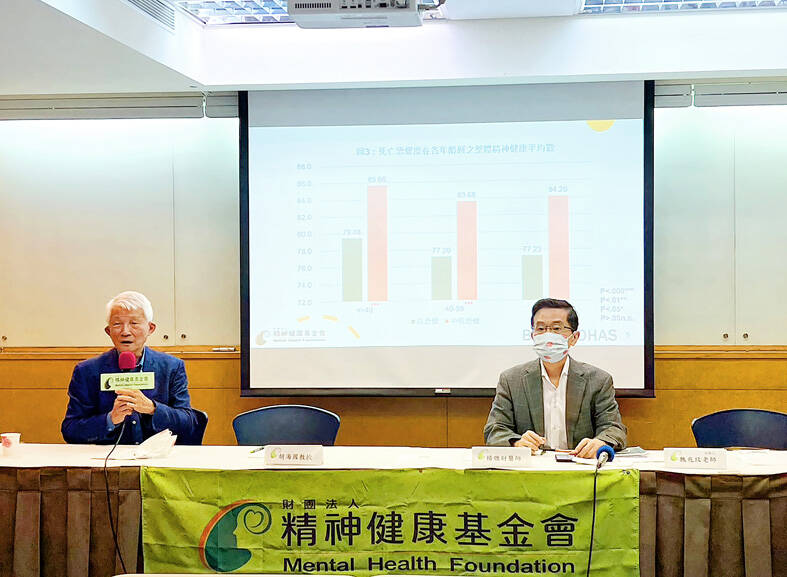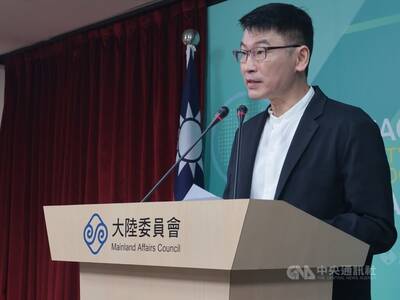The mental health of about 4.43 million adults in Taiwan this year has been affected by the COVID-19 pandemic, the Mental Health Foundation said yesterday, citing its nationwide mental health survey.
The average overall mental health score of respondents, adults aged 20 or older, was 82.4, higher than the “pass” score of 80, which is a good sign, the foundation said.
However, 27.7 percent of respondents scored lower than 80, implying that an estimated 4.43 million adults have relatively poor mental health, the survey showed.

.Photo: CNA
Psychiatrist Yang Tsung-tsair (楊聰財), convener of the foundation’s mental health index division, said that in the “physical and mental health” aspect of the survey, record-high percentages reported three symptoms — poor sleep quality (40.2 percent), anxiety (41.1 percent) and poor memory (40.2 percent).
In the “life control” aspect, 36.6 percent of respondents felt that they “lacked a sense of belonging” and 22.2 percent felt that “the future would not get better,” Yang said, adding that lacking a sense of belonging can lead to feelings of loneliness or depression.
Questions about attitudes toward death were added to the foundation’s annual survey this year, he said, adding that results from such questions suggest that an estimated 2.17 million adults have a high level of fear of death.
The average mental health score among such respondents was 77.8, he said.
National Taiwan University professor emeritus of psychiatry Hwu Hai-gwo (胡海國), the foundation’s chairman, said that the pandemic has affected attitudes toward death, with those whose livelihoods were seriously affected likely feeling a greater sense of fear.
Having a positive attitude toward death can improve mental strength, but it is lacking in Taiwan’s society, so people are encouraged to receive more death education and learn to improve the stability of their living environment to avoid anxiety and poor mental health, Hwu said.
People under 40 are generally more mentally resilient and capable of finding resources to solve problems, but elderly people tend to be less resilient, so they should be treated with extra care to help them maintain their quality of life, he said.
While Taiwan is entering a post-pandemic era, people with greater sensitivity might still feel anxious and afraid to go out, so society should be tolerant of such people and help them return to a normal life, he said.
Even if people have financial difficulties, they can still have a high mental health score if they feel a sense of belonging, which can be achieved through family or social interaction with non-family members, so friends who show support can help reduce feelings of loneliness, Hwu said.
The foundation suggests that people relieve anxiety by performing abdominal breathing to relax the body, exercising to increase dopamine, endorphins and serotonin, maintaining a regular sleeping pattern, and writing a gratitude or happiness journal before going to bed, Yang said.

‘ANGRY’: Forgetting the humiliations and sacrifices of ‘the people of the Republic of China’ experienced disqualified Lai from being president, Ma Ying-jeou said Former president Ma Ying-jeou (馬英九) yesterday criticized President William Lai (賴清德) over what he called “phrasing that downplayed Japan’s atrocities” against China during World War II. Ma made the remarks in a post on Facebook on the 80th anniversary of the end of World War II. Ma said he was “angry and disappointed” that Lai described the anniversary as the end of World War II instead of a “victory in the war of resistance” — a reference to the end of the Second Sino-Japanese War (1937-1945). The eight-year war was a part of World War II, in which Japan and the other Axis

The Mainland Affairs Council (MAC) yesterday announced a ban on all current and former government officials from traveling to China to attend a military parade on Sept. 3, which Beijing is to hold to mark the 80th anniversary of the end of the Second Sino-Japanese War. "This year marks the 80th anniversary of the end of World War II and the Republic of China’s victory in the War of Resistance [Against Japan]," MAC Deputy Minister and spokesperson Liang Wen-chieh (梁文傑) told a regular news briefing in Taipei. To prevent Beijing from using the Sept. 3 military parade and related events for "united

‘OFFSHORE OPERATIONS’: Also in Dallas, Texas, the Ministry of Economic Affairs inaugurated its third Taiwan Trade and Investment Center to foster closer cooperation The 2025 Taiwan Expo USA opened on Thursday in Dallas, Texas, featuring 150 Taiwanese companies showcasing their latest technologies in the fields of drones, smart manufacturing and healthcare. The Taiwan External Trade Development Council (TAITRA), the event’s organizer, said the exhibitors this year include Hon Hai Precision Industry Co (Foxconn), the world’s largest contract electronics manufacturer; AUO; PC brand Asustek Computer; and drone maker Thunder Tiger. In his opening speech, TAITRA chairman James Huang (黃志芳) said he expected Texas to become a world-class center for innovation and manufacturing as US technology companies from Silicon Valley and Taiwanese manufacturers form an industrial cluster

A 20-year-old man yesterday evening was electrocuted and fell to his death after he climbed a seven-story-high electricity tower to photograph the sunset, causing a wildfire on Datong Mountain (大同山) in New Taipei City’s Shulin District (樹林), the Taoyuan Police Department said today. The man, surnamed Hsieh (謝), was accompanied on an evening walk by a 20-year-old woman surnamed Shang (尚) who remained on the ground and witnessed the incident, capturing a final photograph of her friend sitting atop the tower before his death, an initial investigation showed. Shang then sought higher ground to call for help, police said. The New Taipei